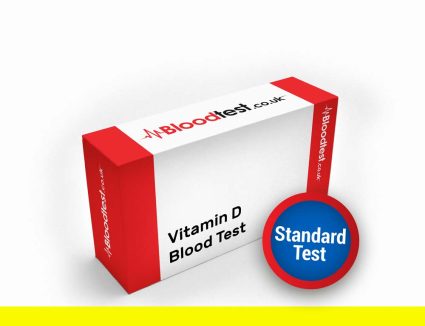Uncover the Critical Role of Vitamin D Testing in Optimising Your Health
Delve into the Vital Functions of Vitamin D in the Human Body

Vitamin D Blood Test in Middlesbrough: Vitamin D is an essential nutrient that plays a pivotal role in numerous physiological functions within the body. Primarily, it significantly enhances bone health by facilitating the absorption of calcium, a mineral crucial for maintaining robust bones and preventing serious health conditions like rickets in children and osteoporosis in adults. Furthermore, maintaining adequate levels of vitamin D is vital for the immune system, ensuring that it functions optimally. Insufficient vitamin D levels can lead to increased vulnerability to infections and chronic health issues, underscoring the necessity for routine testing to monitor levels and undertake necessary measures when required.
Extensive studies have established a connection between vitamin D deficiency and a range of health complications, including cardiovascular diseases, diabetes, and specific cancers. This correlation highlights the importance for individuals, particularly those at higher risk, to actively monitor their vitamin D levels and take corrective actions. Regular testing acts as a proactive measure, enabling early identification of deficiencies and allowing for timely interventions. By prioritising vitamin D monitoring, individuals can significantly improve their health outcomes and overall wellbeing, making the vitamin D blood test in Middlesbrough an essential component of effective health management.
Would You Prefer Audio Information?
 Spotting Signs of Vitamin D Deficiency for Timely Action
Spotting Signs of Vitamin D Deficiency for Timely Action
Recognising the symptoms of vitamin D deficiency is fundamental for initiating timely intervention. Common warning signs include fatigue, bone pain, and fluctuations in mood, all of which can significantly impact your quality of life. Many individuals may experience chronic tiredness, even after sufficient rest; this fatigue can be particularly challenging for those juggling work and family obligations. Additionally, bone discomfort or tenderness often misinterpreted as general aches may indicate serious underlying issues related to bone health.
Moreover, emotional changes such as feelings of depression or anxiety have been linked to low vitamin D levels. Recent research suggests that vitamin D is instrumental in regulating mood and can assist in alleviating depressive symptoms. Being vigilant about these indicators can inspire individuals to seek testing sooner, making the vitamin D blood test in Middlesbrough a crucial resource for safeguarding both physical health and mental wellbeing.
Identifying Populations at Increased Risk for Vitamin D Deficiency
Certain demographic groups are more susceptible to vitamin D deficiency and should prioritise consistent testing. Individuals with limited sun exposure, particularly those residing in urban settings or spending excessive time indoors, are at a heightened risk. This issue is especially pronounced during the winter months in the UK when sunlight is less accessible. Furthermore, individuals with darker skin tones possess higher levels of melanin, which can hinder the skin's ability to synthesise vitamin D from sunlight, placing them at an increased risk of deficiency.
Additionally, individuals with specific medical conditions such as obesity, Crohn’s disease, or kidney disorders may struggle to absorb or utilise vitamin D effectively. It is advisable for these individuals to consult with their healthcare providers regarding regular testing as part of a comprehensive health management strategy. By identifying at-risk populations, we can enhance awareness and promote timely testing, ensuring that all residents of Middlesbrough can achieve and maintain optimal health levels.
The Comprehensive Advantages of Regular Vitamin D Testing

The advantages of routine vitamin D testing extend far beyond mere awareness of one’s levels. For individuals diagnosed with deficiencies, continuous testing is paramount for tracking the effectiveness of treatment strategies, whether through lifestyle modifications or supplementation. This ongoing monitoring is essential for ensuring that individuals are progressing towards achieving adequate vitamin D levels, ultimately leading to improved health outcomes.
Furthermore, regular testing plays a critical role in preventing potential health issues before they arise. By identifying deficiencies early, healthcare providers can recommend dietary adjustments, increased sunlight exposure, or supplementation, thereby mitigating the risks associated with prolonged deficiency. For vulnerable demographics in Middlesbrough, particularly the elderly and those with chronic health conditions, proactive measures based on testing can significantly enhance quality of life and overall wellbeing.
Locating Vitamin D Testing Services in Middlesbrough
Utilising Local GP Services for Convenient Vitamin D Testing
In Middlesbrough, numerous general practitioners (GPs) recognise the significance of monitoring vitamin D levels and provide testing as part of routine health evaluations. During annual check-ups, GPs typically assess various health markers, including vitamin D levels, based on individual health requirements. This integration into standard health checks facilitates residents' ability to stay informed about their vitamin D status without necessitating a separate consultation.
Patients should feel empowered to approach their GP with concerns regarding symptoms that may suggest a deficiency. GPs are adept at delivering comprehensive information about testing options and can offer tailored advice on the most suitable course of action based on individual health profiles. This accessible option is an excellent starting point for anyone considering a vitamin D blood test in Middlesbrough.
Exploring Private Clinics for Rapid Vitamin D Testing

For those who prefer a more immediate or discreet option, Middlesbrough is home to several private health clinics that provide vitamin D testing services. These clinics generally offer a swift and confidential experience, ensuring that results are communicated promptly, often within just a few days. This option can be particularly advantageous for individuals awaiting results due to health concerns or those wishing to manage their health proactively.
The added convenience of private clinics frequently includes supplementary services, such as personalised health consultations, which can assist individuals in interpreting their results and gaining a clearer understanding of their health status. This tailored, one-on-one approach can be highly beneficial for those seeking comprehensive care. As awareness of the importance of vitamin D continues to expand, more residents in Middlesbrough are opting for private testing to ensure they maintain optimal health.
The Ease of At-Home Testing Kits for Vitamin D
In today’s digital era, the availability of at-home vitamin D test kits has significantly increased, providing a convenient alternative for Middlesbrough residents. These kits enable individuals to collect a sample in the comfort of their own homes and send it to a laboratory for analysis, offering a level of privacy that some may prefer. This option is particularly appealing for those who may feel hesitant about visiting healthcare facilities or have busy schedules that limit their ability to attend appointments.
At-home testing kits typically come with comprehensive instructions, and many include online resources to assist users in interpreting their results effectively. While this method is convenient, it is crucial to ensure that the kit is sourced from a reliable provider to guarantee accurate and trustworthy results. This flexibility empowers individuals to take charge of their health and make informed decisions regarding their vitamin D levels and overall wellbeing.
Essential Preparations for Your Upcoming Vitamin D Test
Understanding Fasting Requirements for Accurate Testing Outcomes
When preparing for a vitamin D blood test in Middlesbrough, it is vital to ascertain whether fasting is necessary. Although many vitamin D tests do not require fasting, specific tests or accompanying blood profiles may have different protocols. Confirming any fasting guidelines with your healthcare provider before your appointment is essential. In some instances, fasting for a specified number of hours prior to the test can enhance the accuracy of your results.
While fasting can sometimes be an inconvenience, particularly for those with demanding lifestyles, being aware of these requirements in advance ensures that you arrive at your appointment fully prepared, thereby minimising the risk of rescheduling due to non-compliance with testing protocols. Maintaining open communication with your healthcare provider will clarify any uncertainties, streamlining the testing process for a smoother and more efficient experience.
Identifying Medications That May Affect Your Test Results
Certain medications can influence vitamin D levels; therefore, it is crucial to discuss your current medications with your doctor before undergoing a vitamin D blood test in Middlesbrough. Medications such as steroids and weight loss drugs can affect how vitamin D is metabolised. Any necessary adjustments to your medication regimen should be made under the guidance of a healthcare professional to avoid skewed test results.
Being transparent with your healthcare provider about all medications, including over-the-counter supplements and herbal remedies, can facilitate a clearer understanding of your health status and help ensure that your vitamin D test results are as accurate as possible. This proactive approach enhances the overall effectiveness of your health management strategy.
What to Anticipate During Your Vitamin D Blood Test Procedure
Undergoing a vitamin D blood test is a straightforward process that typically involves a simple blood draw. Patients can expect their blood to be drawn from a vein, which may cause a brief pinch. The entire procedure generally takes only a few minutes, making it an efficient method for evaluating vitamin D levels.
Once the blood is collected, the sample will be dispatched to a laboratory for analysis, where technicians will measure the vitamin D concentration in your blood. Most patients receive their results within a few days through their GP or testing clinic. Knowing what to expect can help alleviate any anxiety associated with the test, making it a more comfortable experience for patients in Middlesbrough.
Deciphering Your Vitamin D Test Results
Understanding Healthy Vitamin D Levels for Optimal Health Maintenance
In the UK, normal vitamin D levels are usually recognised as being between 50 and 125 nmol/L. Familiarising yourself with these benchmarks is crucial for accurately interpreting your results. If your levels fall below 50 nmol/L, it indicates a deficiency that may necessitate intervention through lifestyle modifications or supplementation. Conversely, levels exceeding 125 nmol/L can signify potential toxicity, underscoring the necessity for careful monitoring.
Understanding these ranges empowers individuals to take control of their health choices and explore appropriate treatment options when necessary. Regular discussions with healthcare providers regarding vitamin D testing results are essential for maintaining optimal health, particularly for Middlesbrough residents who may face a higher risk of deficiencies.
Effectively Interpreting Your Test Results with Professional Support
Once you obtain your vitamin D test results, your healthcare provider will assist you in interpreting them. Understanding whether your levels are classified as deficient, insufficient, or optimal is crucial for determining the next steps in your health journey. Deficient levels may require immediate action, such as dietary changes or supplementation, while optimal levels provide reassurance regarding your current health status.
Engaging in discussions about the implications of your results with a knowledgeable healthcare provider is vital. They can offer tailored recommendations and strategies that cater to your individual health needs. For individuals in Middlesbrough, regular consultations with healthcare professionals can establish a consistent support system for effectively managing vitamin D levels.
Determining Your Next Steps Following Your Vitamin D Testing
After your vitamin D blood test, your healthcare provider will review the results with you and outline potential next steps. If your levels are found to be low, they may recommend vitamin D supplements or dietary modifications to elevate your levels. The advised dosage and type of vitamin D (D2 vs D3) will depend on your specific circumstances and should be customised to meet your individual needs.
If your levels are within a normal range, providers might still recommend periodic testing to ensure stability, especially for individuals who belong to higher risk categories. Recognising that vitamin D management is an ongoing process can encourage a proactive approach to health, particularly for residents of Middlesbrough.
Understanding the Factors Influencing Your Vitamin D Levels
Numerous factors can impact your vitamin D levels, including age, skin tone, sun exposure, and diet. As individuals age, their skin becomes less efficient at synthesising vitamin D from sunlight, making older adults particularly susceptible to deficiencies. Similarly, people with darker skin may require more sunlight exposure to generate sufficient vitamin D, necessitating additional vigilance.
Sun exposure is a critical component; residents of Middlesbrough may struggle to obtain adequate sunlight, particularly during the winter months. Diet also plays a significant role; incorporating foods rich in vitamin D, such as fatty fish, egg yolks, and fortified products, is essential for maintaining healthy levels. Discussing these factors with a healthcare professional can provide valuable insights into your risk profile and effective management strategies.
Examining the Costs of Vitamin D Testing in Middlesbrough
Exploring NHS Testing Costs for Affordable Healthcare Access
Utilising the National Health Service (NHS) for a vitamin D blood test in Middlesbrough may offer significant financial relief, as tests can be free or low-cost based on individual health needs. Those exhibiting deficiency symptoms or belonging to at-risk groups often benefit from testing without incurring additional costs. This accessibility enables residents to prioritise their health without the burden of excessive fees.
It is important to understand that the NHS has specific testing criteria, and patients may need to demonstrate a medical need or present certain symptoms to qualify for free testing. Familiarity with these guidelines can assist individuals in navigating the system more effectively, ensuring they receive the essential care they require.
Understanding Private Testing Fees for Expedited Service
For individuals who prefer to avoid NHS waiting times, private vitamin D testing in Middlesbrough typically ranges from £30 to £100, depending on the clinic and services provided. While this option may necessitate a financial commitment, many individuals perceive the convenience and speed of private testing as a worthwhile investment in their health.
Moreover, some private clinics provide comprehensive health assessments that include vitamin D testing, offering a holistic view of an individual’s health status. When selecting this option, it’s crucial to research clinics thoroughly to ensure they are reputable and deliver accurate testing services.
Insurance Coverage for Vitamin D Testing Expenses
Some health insurance plans in the UK may cover the cost of vitamin D testing, although this varies significantly among providers. It is wise to check with your insurance company to clarify what your plan encompasses. For individuals with coverage, this can substantially reduce out-of-pocket costs associated with testing and consultations.
Understanding your insurance benefits is essential for making informed decisions regarding health management. This knowledge empowers you to utilise available resources effectively, ensuring you receive the best possible care, particularly regarding the vitamin D blood test in Middlesbrough and its implications for your health.
Investigating Treatment Strategies for Vitamin D Deficiency
Incorporating Dietary Sources of Vitamin D into Your Daily Meals
Integrating dietary sources of vitamin D into your meals is a practical and effective strategy for naturally boosting your levels. Oily fish (such as salmon and mackerel), egg yolks, and fortified dairy products are excellent sources. Consuming a balanced diet that includes these foods can assist individuals, particularly those at risk of deficiency, in maintaining adequate vitamin D levels.
Furthermore, fortified cereals and plant-based milks provide valuable alternatives for vegetarians or those who do not consume fish. Being aware of these dietary options not only aids in preventing deficiencies but also fosters healthier eating habits overall. For Middlesbrough residents, accessing local markets and health food stores can facilitate the procurement of these vitamin-rich foods.
The Crucial Role of Sunlight Exposure in Maintaining Vitamin D Levels
Sunlight serves as a natural source of vitamin D, and spending time outdoors can significantly contribute to your overall vitamin D levels. Residents of Middlesbrough should aim for at least 15 to 30 minutes of sunlight exposure several times a week, particularly during the spring and summer months. However, it is crucial to balance sunlight exposure with the risks of skin cancer, especially in the UK, where UV levels can fluctuate greatly.
Understanding the importance of sunlight in your vitamin D management strategy is essential. Public health guidelines recommend that while sunlight is beneficial, it is equally vital to practice sun safety, using sunscreen when necessary to protect your skin from harmful UV rays. Striking a balance between these considerations provides a well-rounded approach to sustaining healthy vitamin D levels.
Utilising Vitamin D Supplements for Effective Health Restoration
For individuals with low vitamin D levels, healthcare providers in Middlesbrough may recommend supplements to assist in restoring optimal levels. These supplements are available in various forms, including capsules, tablets, and liquids, and can be customised to meet individual needs based on the severity of the deficiency.
The dosage and type of supplement prescribed will depend on your specific circumstances, including age, health status, and existing medical conditions. Regular follow-ups with your healthcare provider can help monitor progress and adjust supplementation as necessary. This collaborative approach fosters a successful path toward achieving and maintaining sufficient vitamin D levels, which are vital for overall health.
Frequently Asked Questions Regarding Vitamin D Testing
What does a vitamin D blood test measure?
A vitamin D blood test evaluates the vitamin D level in your blood, assisting in determining whether you possess sufficient levels for optimal health.
Why is vitamin D essential for maintaining good health?
Vitamin D is crucial for sustaining bone health, supporting immune function, and promoting overall wellbeing. It aids the body in absorbing calcium and plays a role in various physiological functions.
How often should I undergo testing for vitamin D levels?
Individuals at risk for deficiency may benefit from annual testing, while those with normal levels might consider testing every 2-3 years, depending on their healthcare provider's recommendations.
Is it advisable to take vitamin D supplements without testing first?
While some individuals take supplements without prior testing, it is recommended to consult with a healthcare provider to ensure proper dosage and necessity based on individual health requirements.
What potential risks are associated with vitamin D deficiency?
Vitamin D deficiency can lead to bone pain, an increased risk of fractures, fatigue, and a weakened immune system, among other health complications.
What are the common symptoms linked to vitamin D deficiency?
Common symptoms include fatigue, bone pain, muscle weakness, and mood fluctuations. If you experience these symptoms, consider scheduling a vitamin D blood test.
Can I obtain sufficient vitamin D from diet alone?
While dietary sources can contribute to vitamin D intake, many individuals, particularly in the UK, may require sunlight exposure or supplements to meet their vitamin D needs.
How long does it typically take to receive results from a vitamin D test?
Results from a vitamin D blood test usually take a few days to process, depending on the laboratory's turnaround time and the healthcare provider's protocols.
Is fasting necessary before undergoing a vitamin D test?
Fasting is generally not required for a vitamin D blood test, but it's advisable to confirm any specific instructions with your healthcare provider beforehand.
Where can I access a vitamin D blood test in Middlesbrough?
You can obtain a vitamin D blood test at local GP surgeries, private clinics, or through at-home testing kits available online or at pharmacies.
Connect with us on Facebook for more information!
This Article Was First Found On https://bloodtest.co.uk
The Article Vitamin D Blood Test: Essential Health Check in Middlesbrough Was Found On https://limitsofstrategy.com

